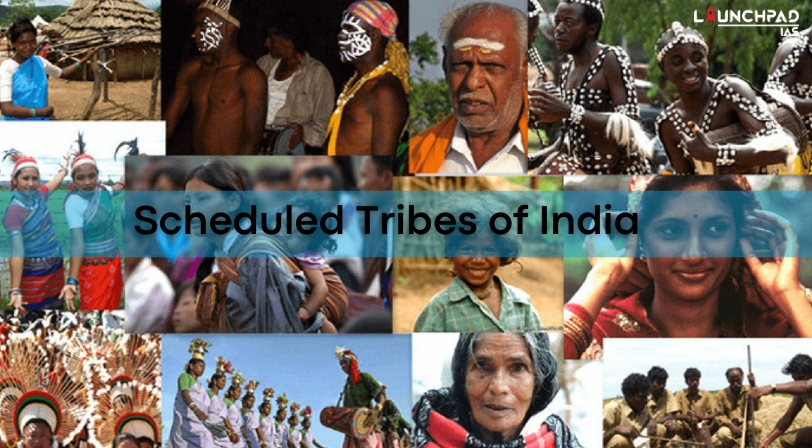What is a tribe?
The tribes are the autochthonous or native people of the land who are believed to be the earliest settlers in the Indian Peninsula. They are generally called Adivasis, implying original inhabitants.
The ancient and medieval literature mentions a large number of tribes living in India.
Definition of Scheduled Tribe
The term ‘Scheduled Tribes’ first appeared in the Constitution of India.
Article 366 (25) of the Constitution of India defined scheduled tribes as “such tribes or tribal communities or parts of or groups within such tribes or tribal communities as are deemed under Article 342 to be Scheduled Tribes for this constitution”.
Article 342 prescribes the procedure to be followed in the matter of specification of scheduled tribes.
Why the name “Scheduled Tribes”?
The tribal communities in India have been recognized by the Indian Constitution under ‘Schedule 5’ of the constitution. Hence the tribes recognized by the Constitution are known as ‘Scheduled Tribes’.
Article 366 (25) defined scheduled tribes as “such tribes or tribal communities or parts of or groups within such tribes or tribal communities as are deemed under Article 342 to be Scheduled Tribes for this constitution”
What are the Essential Characteristics for a Community to be Identified as a Scheduled Tribe?
- According to Lokur Committee (1965), the essential characteristics are:
- Indication of Primitive Traits
- Distinctive Culture
- Shyness of Contact with the Community at Large
- Geographical Isolation
- Backwardness
Significance of the Scheduled Tribes
- Safeguarding Biodiversity:
- While Indigenous peoples own, occupy, or use a quarter of the world’s surface area, they safeguard 80% of the world’s remaining biodiversity.
- They hold vital ancestral knowledge and expertise on how to adapt, mitigate, and reduce climate and disaster risks.
- India’s ethnic people have played a vital role in preserving the biodiversity of several virgin forests and have conserved flora and fauna in sacred groves of tribals.
- Preserving Languages:
- With 370-500 million indigenous peoples representing the majority of the world’s cultural diversity, they speak the greater share of almost 7000 languages in the world.
- Contributing to Zero Hunger Goal:
- The crops grown by indigenous people are highly adaptable.
- They can survive drought, altitude, flooding, and any kind of extremes of temperature. As a result, these crops help create resilient farms.
- Also, quinoa, moringa, and oca are some of the native crops that can expand and diversify our food base. These would contribute to the goal of attaining Zero Hunger.
Basic Safeguards provided by the Indian Constitution for STs
- The Constitution of India does not endeavor to define the term ‘tribe’, however, the term Scheduled Tribe’ was inserted in the Constitution through Article 342 (i).
- It lays down that ‘the President may, by public notification, specify the tribes or tribal communities or parts of or groups within the tribes or tribal communities or parts which shall, for the purposes of this Constitution, be deemed to be Scheduled Tribes.
- The Fifth Schedule of the Constitution provides for the setting up a Tribes’ Advisory Council in each of the States having Scheduled Areas.
Educational & Cultural Safeguards:
- Article 15(4): Special provisions for the advancement of other backward classes (it includes STs)
- Article 29: Protection of Interests of Minorities (it includes STs)
- Article 46:The State shall promote, with special care, the educational and economic interests of the weaker sections of the people, and in particular, of the Scheduled Castes, and the Scheduled Tribes, and shall protect them from social injustice and all forms of exploitation.
- Article 350: Right to Conserve Distinct Language, Script or Culture,
Political Safeguards:
- Article 330: Reservation of seats for STs in Lok Sabha
- Article 332: Reservation of seats for STs in State Legislatures
- Article 243: Reservation of seats in Panchayats
Administrative Safeguard:
- Article 275: It provides for the grant of special funds by the Union Government to the State Government for promoting the welfare of Scheduled Tribes and providing them with a better administration.
National Commission of Schedule Tribes (NCST)
Background:
- The NCST was established by amending Article 338 and inserting a new Article 338A in the Constitution through the 89th Constitutional Amendment Act, 2003.
- By this amendment, the erstwhile National Commission for Scheduled Castes and Scheduled Tribes was replaced by two separate Commissions namely:
- The National Commission for Scheduled Castes (NCSC)
- The National Commission for Scheduled Tribes (NCST)
Composition
- The NCST panel has one chairperson, one vice-chairperson, and three members (two out of VC, and the members should be from the ST community). At least one member should be a woman.
- The Chairperson, the Vice-Chairperson, and the other Members hold office for a term of 3 years.
- The members are only eligible for appointments for up to two terms.
- The President appoints the members by warrant under his hand and seal.
Powers and Functions
- The Commission is vested with all the powers of a civil court while investigating any matter on the inquiry of any complaint relating to deprivation of rights and safeguards for Scheduled Tribes.
- To investigate & monitor matters relating to Safeguards provided for STs under the Constitution or other laws or Govt. Order, to evaluate the working of such Safeguards.
- To inquire into specific complaints for the deprivation of rights and safeguards of the Scheduled Tribes.
- To participate and advise on the planning process of socio-economic development of the Scheduled Tribes and to evaluate the progress of their development under the Union and any State.
- To present to the President, annually and at such other times as the Commission may deem fit, reports upon the working of those safeguards.


